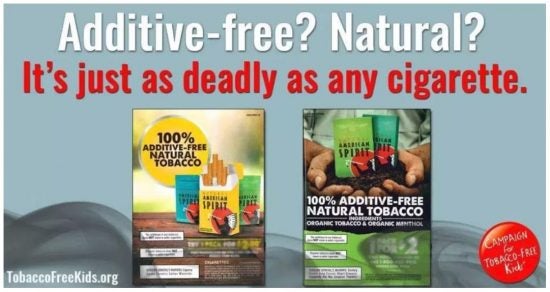I used to wait tables. I started as a teen at my family’s restaurants before smoke-free workplace laws swept the nation. Like most restaurants at the time, we had a smoking section, and I oftentimes was assigned to it. I was thrilled when the city eventually adopted a clean indoor air ordinance, and a few years later, statewide protections followed. As a result, my exposure to secondhand smoke at work decreased substantially, but not entirely. I was still exposed from coworkers smoking outside at shift changes and breaks. At the time, smoking rates among food prep and service-related workers were the second highest of all occupation groups at 30% (compared to 19.6% of all working adults). The most recent analysis of tobacco use among working adults shows some progress with a decrease to 25.1%, but food prep and service-related workers continue to have the second highest rate by occupation.
So how does this relate to American Spirits cigarettes? I remember conversations with two different coworkers about them. By that time I had gotten involved with tobacco control programming through my college’s health center (I’ve previously confessed to being a total nerd!) and had a mentor who reminded me often that the perspective and experience of people who smoke should always be part of tobacco control efforts. So I would chat up coworkers who were willing to talk about their smoking. They were always enlightening conversations, but I remember finding myself unsure of how to address the American Spirits’ “organic,” “natural,” and “additive-free” rhetoric with these two particular coworkers.

They both knew about the myriad of negative health consequences caused by, and associated with, cigarette smoking, but it didn’t outweigh their “but it might not happen to me” mentality and the various forms of more immediate “enjoyment” they got out of smoking. And they would always tell me not to worry because they smoked organic, natural cigarettes that didn’t have any additives, which seemed to imply they believed them to be less harmful in some way. I was skeptical at the time that American Spirits were “healthier” than any other cigarette, and I wish I knew then what I know now: they weren’t alone in their misperceptions (in 2013-2014, a majority of American Spirits cigarette smokers (55-67%) said their brand “might be less harmful” than other brands), and there’s a lack of evidence to demonstrate American Spirits are healthier or less harmful than other cigarettes and some evidence to the contrary.
Some of that evidence is featured in the open-access, July 2019 special issue of Tobacco Regulatory Science. The articles demonstrate continued inaccurate beliefs about American Spirits and other cigarettes advertised as “natural.” From chemical characterization showing that key harmful smoke constituents are present in American Spirits cigarettes at levels comparable or higher to other brands, including increased average levels of nicotine in smoke (3.3 mg/cigarette compared to 2.4), to biomarker data in American Spirits smokers confirming higher nicotine exposure per cigarette compared to other brands, and a quarter to almost half of young adults viewing old and new American Spirits ads perceiving the product to be less harmful than other cigarettes, the evidence suggests that American Spirits cigarettes may be more addictive than other cigarettes brands and that they continue to violate the federal Family Smoking Prevention and Tobacco Control Act’s restrictions on modified risk claims and prohibition on false and misleading advertising.
More efforts are clearly needed to correct these misperceptions. The U.S. Food and Drug Administration (FDA) took initial steps against the manufacturer of American Spirits, which prompted new (but still misleading) advertising of the products in 2017. Groups criticized the FDA agreement as “wholly inadequate” and “a gift to the tobacco industry, permitting … the [continuance of] highly misleading” advertising. Still, if I could talk to those coworkers from 15 years ago today, I’d certainly find a way to mention the FDA’s actions and the mounting scientific evidence that supports ongoing litigation against the makers of American Spirits about this very same thing. And then I’d hope we’d have yet another set of thoughtful conversations prompting feelings of mutual benefit, or better yet, that I’d have made a fool of myself because they’d no longer be American Spirits “believers” or smokers.



